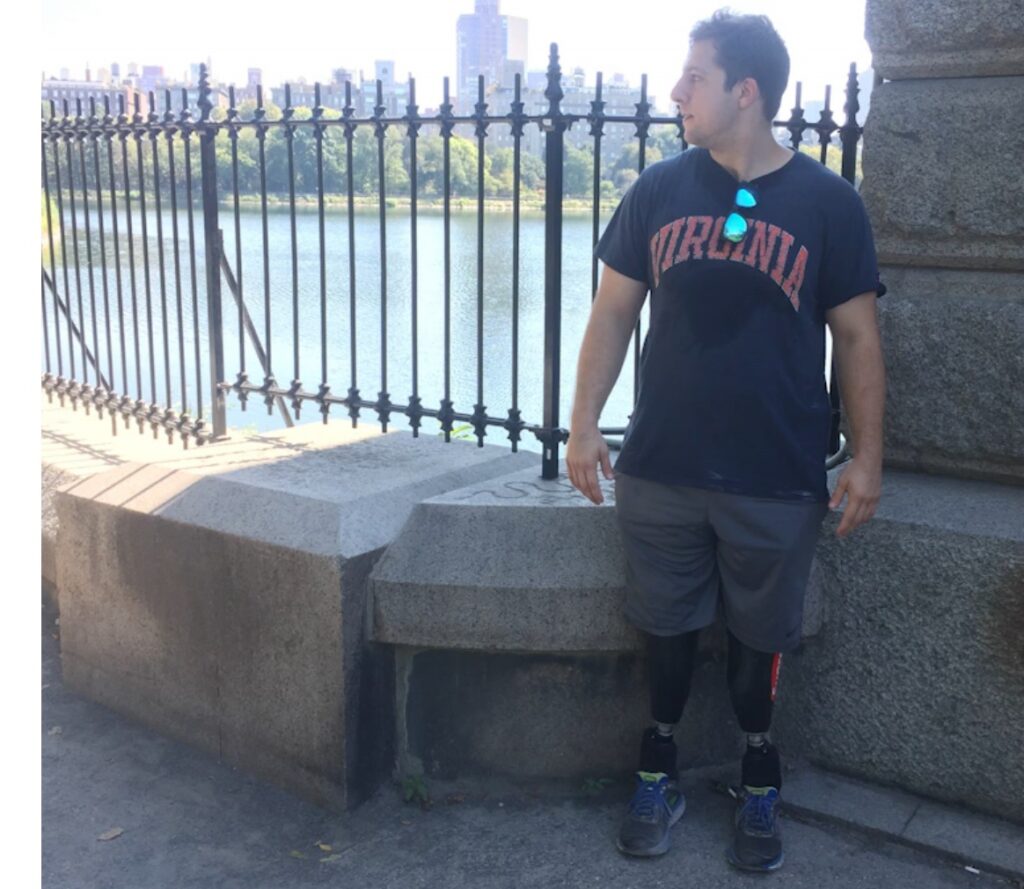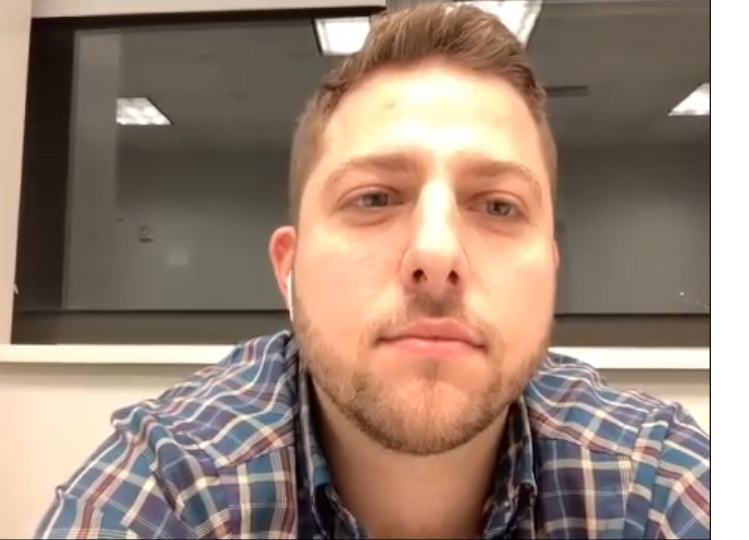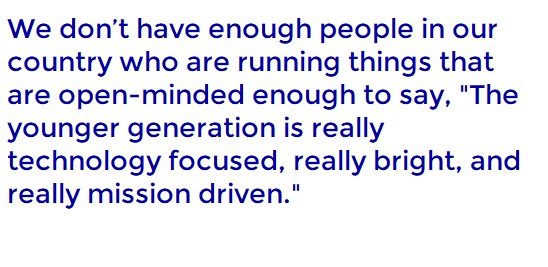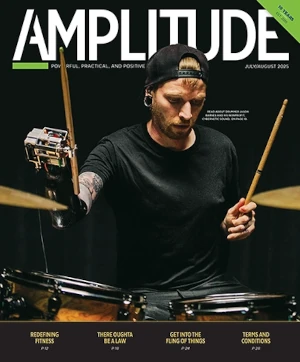Don’t look back, Baby Boom amputees. Millennials and Gen Zers are nipping at your heels.
“When you get a disability, you start to think really critically about things,” says bilateral amputee Samuel Rossiello. “There are a lot of people in my age group that just don’t know how to deal with mediocrity.”

That’s one of the core takeaways from the Young Adults Roundtable that the 27-year-old Rossiello co-facilitated with Alexandra Capellini a couple of weeks ago during the Amputee Coalition National Conference. From the workplace to the health care system to education and beyond, Rossiello’s cohort keeps stumbling over systems and paradigms that were designed in the last century and lag far behind the possibilities afforded by today’s technology. Young amputees are finding their expectations unmet on a broad range of fronts, and they’re already pushing for ways to breathe new life into old practices.
Lest he be branded a malcontent, Rossiello is quick to attest to his personal good fortune. He’s on a healthy career trajectory, satisfied with his prosthetist, and free of significant financial constraints. Moreover, he hasn’t suffered major disruptions because of COVID. But even with those advantages, Rossiello keeps running into roadblocks and detours that test his patience, sap his energy, and cut him off from opportunities—and he knows the barriers are even greater for amputees who lack all the privileges he enjoys.
The Young Adults Roundtable clearly struck a chord, because there’s already an encore event on the calendar: On September 11, the Amputee Coalition is hosting a Young Adults Social Hour for limb-different adults aged 18 to 25. This rising generation is getting its act together and preparing to make its mark. To get a sense of what’s coming, we caught up with Rossiello shortly after the conference. Our conversation is edited for length and clarity.
Tell me how you came to be chosen to lead this particular breakout session.
I lost both of my legs below the knee in 2016 when I was involved in an accident. In 2018 I became a counselor at the [Amputee Coalition’s] Paddy Rossbach Youth Camp, and last November I got certified to be a Certified Peer Visitor. Also, I’ve been pretty transparent about some of the other struggles I’ve faced—mental, physical, emotional, all of that. We talked about it a lot at the Certified Peer Visitor trainings, so that’s probably one of the reasons why I was chosen to lead the conference session.
Another reason might that I’m part of a group at my job that’s working on diversity, inclusion, and accessibility.
What kind of work do you do?
I work in New York for a national consulting firm. I started out in database management, data strategy, and analytics, but after my accident I started working remotely. So now I do various internal projects, mainly focused in technology management. I work with higher-level leaders who have no idea how technology works. I find out what their business problems are, and then I work with IT developers who can’t always articulate business problems. I’m the liaison between them and the business leaders. I’ve been doing that for the last four years, and I’m in the midst of applying to graduate school to get my MBA, probably with a focus in health care management and technology.

Before my accident, I used to serve our external clients. But when I got back to work after my accident, I would apply for client service projects and I would be qualified for it, and our project lead would say “Great, when can you start,” and then I’d have to have a really tough conversation.
A tough conversation about what?
I’d have to tell them, “Hey, by the way, I have a disability. I have a travel restriction.” And they would say, “The client needs you on site every day in D.C., so no go.” I tell them I’m happy to spend two weeks out of the month in D.C. and come back here for the other two weeks. But that’s an extra expense for our company, and they claim that our client wants us on the site every single day. So because of that, I don’t get put on the team.
And that sort of thing happens routinely?
Well, you just end up on a different path. I used to serve our external clients before I lost my legs. Now I work internally. My own company is my client. I work on a lot of their internal systems and strategy. My company has a program for their employees where they sponsor you to get your MBA, but you have to work in client services. It’s not available to people who work in internal business development. So I had to argue my case—I used to be in client services, and the only reason I’m not there now is because I have a disability. It’s got nothing to do with my performance.
I had a friend suggest to me, “Why don’t you just do client services projects that are based in New York, so you don’t have to travel?” But what if those projects don’t fit my strengths or my career path? When you compare that to what other people would have available to them, it’s really limiting and it puts me at a big disadvantage in my career.
Do you think your company recognizes that they’re also hurting themselves with these policies, by not making the most of their talent pool?
It definitely is being addressed. Here’s something I learned from serving on the diversity and inclusion working group at my company. If you look at the statistics, 90 percent of corporations claim to have a diversity and inclusion program, but only 4 percent of those include disability. They include everything else—sex, gender identity, sexual orientation, religion, obviously race. But disability is usually not included. That’s crazy, right? I talked to the disability representative at our company, and she said, “We’ve scored 100 on the Disability Equality Index (maintained by Disability:IN) five years in a row.” And I said, “Well that’s really funny, because I’ve had some issues here. So let’s talk about those.”
What’s on the short list of changes you’d like to see right away?
There are so many things I’ve been working on. For example, with diversity recruiting, you usually don’t have representation in HR. Whether it’s minority hiring or disability hiring, even if you have people who are empathetic, they just don’t know the experiences of people who are unlike them. For example, my friend Bryanna [Copeland] is a bilateral amputee, above-knee, and she uses a wheelchair. She uses public transportation to get to work, and it takes her one or two buses. She’s had situations where the bus has literally left her because the driver didn’t want to put the ramp down. You really have to have people who understand that kind of situation talking about policy and bringing about change.

One of the girls in the [Young Adults] Roundtable has just started to college. She just lost her legs three months ago, and she hasn’t gotten fitted with prosthetics yet, so she’s crutching through campus. I had to explain to her that the university should have a service that should be able to take her between classes, or she should be allowed to take a car between classes. She would have spent the next year crutching through campus.
If there was a centralized indicator for disability status, she wouldn’t have to ask. You could put that on your driver’s license and scan it whenever you’re trying to get a service, whether it’s at work, on campus, at the doctor’s office, wherever it is. That would not only create universal access to support services, it would also promote a universal understanding of what a person needs based on their abilities or disabilities or whatever. The way it works now, everywhere I go I have to start the process over again. I have to apply for a disability license, a handicap pass, I have to apply separately for disability programs at work. Every time, I have to give a separate doctor’s note to prove my disability. When I applied for my driver’s license [Rossiello drives with hand controls], it got kicked back to me saying my medical records weren’t current enough, even though they were only three months old.
If you want to solve this at a broad, sweeping level, you would need some sort of universal identifier of disability status, so you have an answer to your question everywhere you go—instead of having people crutching through campus because they don’t know what questions to ask or who to talk to.
Is that the kind of problem you’d like to work on once you have your MBA?
The main things I’d want to solve with my MBA are access to prosthetics, and access to information so doctors can be better informed to solve problems. The surgeon who did the amputations on my legs told me she often doesn’t have the patient’s full patient history available to her. Blockchain technology can solve that problem, because it can create paper trails for documents that travel with the patient. And then you could have somebody with a medical mind, somebody like a nurse practitioner, to serve as the patient’s portfolio manager.
Here’s an example. A woman I know developed Guillain-Barré, an autoimmune disorder that attacks your nerves. It’s rare and not easy to diagnose. She went to one doctor, then started with another doctor, then went to a third doctor, and three years in she still didn’t have a diagnosis. She has to go to every doctor she’s been to, collect all the information, and bring it to the next doctor because all the information is in different EHR systems.
The current health care system doesn’t incentivize providers to take good care of patients. It incentivizes them to get you in and out, like at McDonald’s. It’s really hard to put a compensation metric on doctors that’s based on good results, but that would be number one for me. Better information for patients about how to get good care also has to be a priority. If you’re going to a doctor’s office, the people who work at the front desk probably didn’t go into the medical field for the same reason your doctor did. I always have to divert to a second or third resource to get my problems solved, because the front-line gatekeepers either doesn’t have the incentives to help you, or they don’t want to get into trouble. There are a lot of litigious people out there.
Do you think being technologically adept is an equalizer for your generation? Or is it still hard to get decision-makers to listen when you’re a young person?
There are people at my company who have this older style of thought which says that if you’re the boss, you’re the smartest. But the bosses who are doing well at my company are the ones who say, “I have no idea how to solve this problem—you tell me how to solve it.” We don’t have enough people in our country who are running things that are open-minded enough to say, “The younger generation is really technology focused, really bright, and really mission driven.”



